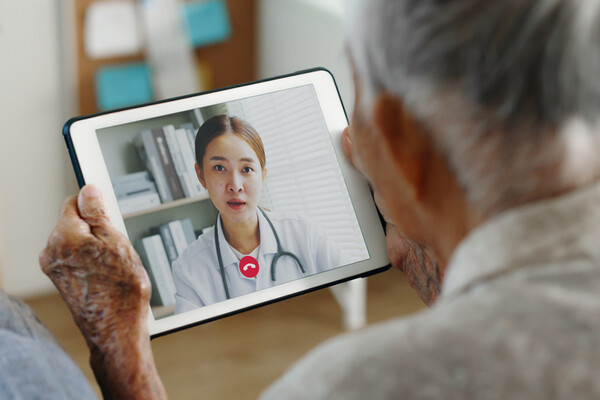The government’s upcoming launch of a telemedicine pilot program next month has sparked intense criticism from various stakeholders, including the medical community, civic groups, and industry associations, for all different reasons.

On May 17, the government released the direction for the pilot project, which will begin in June.
In essence, telemedicine will be provided mainly at clinics for returning patients except for children, and contactless care for children will be available only on holidays and at night times. Drug delivery will be banned except for cases in remote areas and those with difficulty in mobility.
While the medical community agrees in principle with the government’s stance to offer telehealth only for returning patients, doctors still argue that telemedicine should not be expanded to care for children.
The telehealth platform industry is calling for a complete review, saying that limited telemedicine only for returning patients is “a death sentence for the industry.”
More specifically, patients with chronic diseases such as hypertension and diabetes must have a history of treatment within one year and other diseases within 30 days to be eligible for telemedicine.
In addition, patients who live in rural areas with a lack of medical centers, as well as the elderly over the age of 65 and people with disabilities who have limited mobility, can also use telemedicine as first-time patients.
Patients with confirmed infectious diseases under the Infectious Disease Control And Prevention Act, including Covid-19 and influenza, can use telemedicine as first-timers.
Although telehealth will be offered mainly at clinics, it can be available at hospitals for returning patients with rare diseases or for those who need continuous management after surgery or treatment.
The treatment method is based on a video, but voice calls are allowed as an exception in cases for patients without a smartphone.
Prescriptions are faxed or emailed to the pharmacy designated by the patient, and the prescribed medication can be picked up by the patient or a guardian or acquaintance through an agreement between the patient and the pharmacist.
However, complementary measures will be taken for the elderly and disabled with limited mobility and those with confirmed infectious diseases.
“The pilot project plan is currently in the stage of collecting opinions from experts and will be finalized before the implementation on June 1 after consultation with the authorities and further review,” the government said.
The pilot run of telemedicine will operate for three months until the end of August.
Physicians raise safety concerns
Despite the government’s explanation, the medical community including pediatricians and psychiatrists raised safety concerns.
Doctors’ groups such as the Korean Medical Association, the Korean Dental Association, and the Korean Pharmaceutical Association argued that “children and adolescents are a group of patients with inarticulate speech and atypical symptoms, and due to such characteristics, face-to-face medical treatment must be carried out with patient safety as the top priority.”
“We are deeply concerned that the government’s telemedicine pilot project is being done without detailed discussion with the medical community,” the three groups said. “It is not possible to guarantee the same level of effectiveness and safety as face-to-face care, which is a proven method of promoting and protecting public health.”
Psychiatrists have also voiced their opposition, citing the risk of misdiagnosis.
“How many doctors can properly treat elderly and pediatric patients through telemedicine,” the Korean Association of Psychiatrists (KAP) said in a statement last Friday. “Who will be held accountable if something goes wrong for some mental illnesses, such as self-harm and suicidal tendencies, treated by telemedicine?”
The plan to implement telemedicine should be canceled immediately, and efforts should be focused on returning to in-person care as quarantine levels ease, the KAP added.
Civic groups worry about excessive care
Civil society organizations are also raising their voices in opposition.
“During Covid-19, platform companies have created numerous problems, including encouraging excessive medical care,” the Free Healthcare Movement, a coalition of more than 40 civic health organizations, said in a statement on Friday.
The coalition urged the government to halt the pilot project, saying it would worsen these problems.
The civic groups also argue that private insurance companies will use patients’
personal information to make a profit.
This is in line with the concerns of the medical community.
Kim Jong-min, director of insurance at the KMA, who attended a discussion on guidelines for providing health insurance data held by the National Health Insurance Service (NHIS) and the Health Insurance Review and Assessment Service (HIRA) on May 17, had strongly criticized the private insurance groups.
“It is obvious what kind of insurance plans private insurance companies will make with the data from NHIS and HIRA,” Kim said. “While the government claims that the information provided will be redacted, it is not true as the NHIS’s data contains all financial information, and private insurers will be able to infer who the data belongs to.”
Yoon Myung, secretary general of Consumers Korea, an organization that has been active in promoting consumer rights and interests, emphasized that private insurers should be able to give people trust.
“There have been several personal information leak cases, all of which were related to private companies,” said Yoon. “It seems premature to suddenly provide data to for-profit insurers at a time when Korea is in the initial stages of opening such medical data.”
It is more urgent for the private insurers to build trust with the public first, Yoon added.
Telemedicine companies say pilot telemedicine is ‘going backward’
The Korea Telemedicine Industry Council, an affiliate of the Korea Startup Forum, said the telemedicine pilot project is a death sentence for telemedicine in Korea because it basically banned virtual care for first-time patients.
The council called for a complete overhaul.
“The government’s pilot project is actually an anti-telemedicine project and a death sentence for telemedicine in Korea because it does not reflect the reality of the telehealth delivery system,” the council said. “The government will be criticized for undoing all the progress made during the Covid-19 pandemic, and for going backwards alone against a global trend of deregulation.”
The council noted that it is a serious contradiction to the purpose of telemedicine in nature — to offer virtual service to first-time patients who are unable to visit a hospital.
“In such an environment, the private telemedicine services become unsustainable and will be forced to go out of business,” the council said. “Therefore, we urge the government to redefine second-time treatment and expand the scope of first-time treatment to ensure people’s choice of care and revise pilot programs to improve access to telemedicine right now.”




